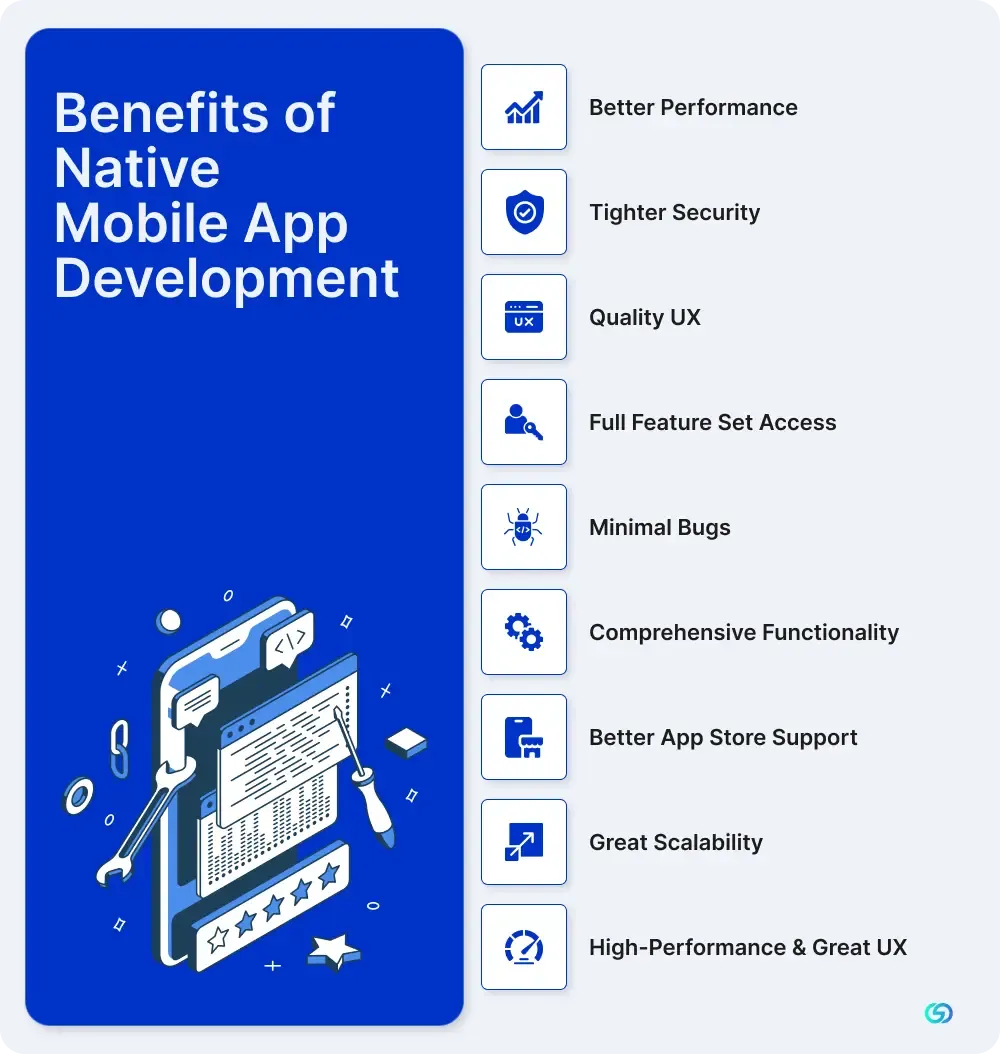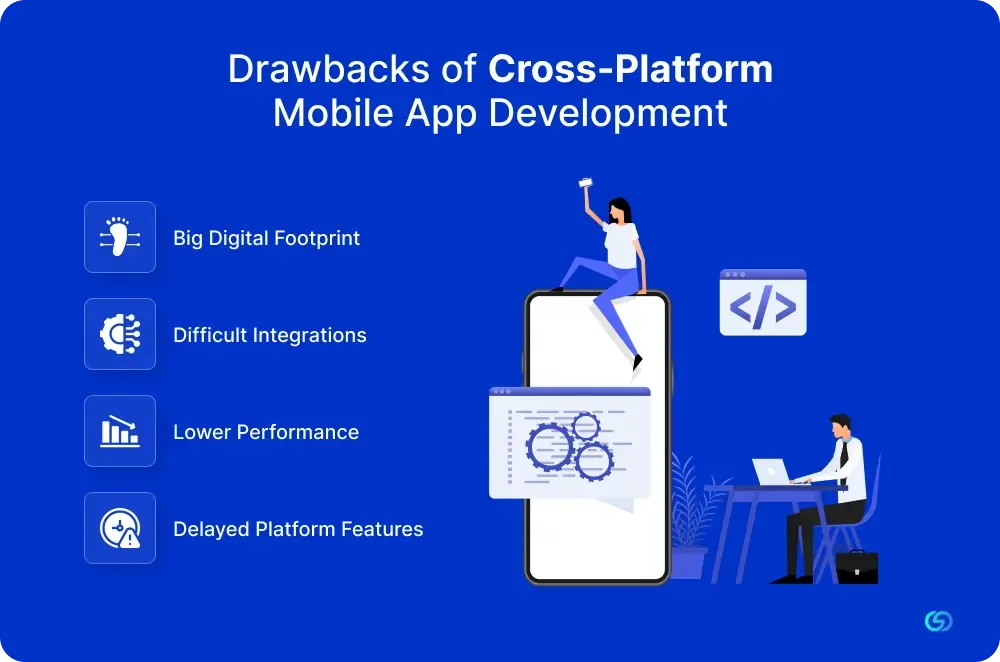- 2025-06-24
Native vs Cross-Platform Apps: What’s the Right Choice for Your Business?

Audio Track
Table of Contents
Key Takeaways:
- Native development allows you to develop applications for either Android or IOS. Cross-platform mobile development enables you to create apps targeting various operating systems.
- In Native app development developers usually code applications in a specific programming language. This depends on the operating system they are developing.
- The advantages of Native apps include better performance, high-quality UX, comprehensive functionality, great scalability, high-performance, full feature set access, great scalability, and more.
- Cross-platform mobile apps are developed from a single code base. The goal of developing cross-platform applications is to target several operations in a single project.
- The advantages of Cross-platform apps include code reusability, fast development, easy maintenance, etc.
- While making a choice, consider the time to market, security, performance and development cost.
In the mobile-first world of today, companies are more and more relying on mobile applications to acquire, connect with, and serve their users. Be it an eCommerce website, a fintech app, or a logistics app, choosing between cross-platform and native development is significant in deciding the app's performance, development expense, user experience, and time-to-market.
This complete tutorial contrasts native and cross-platform mobile development strategies to guide you in making an informed decision for your company.
How to Make a Choice Between Native and Cross-platform?
The operating systems you are building the application for are the main difference between native and cross-platform development. Native development enables you to develop applications for either Android or IOS. Cross-platform mobile development enables you to make apps targeting various operating systems.
The difference between native and cross platform apps and how they are developed needs to be explored.
What is a Native Mobile Application?
Native mobile applications are developed for targeting either Android or iOS. Developers usually code applications in a specific programming language. This depends on the operating system they are developing.
In the case of Android, it is either Java or Kotlin. Java was the very first language used for Android development, while Kotlin was introduced in 2017. Kotlin has gained popularity for supporting both functional and object-oriented programming.
In the case of IOS, developers make use of Objective-C or Swift. Objective-C is an extension of the C programming language and was the very first language that was used for IOS development. Swift was introduced by Apple in 2014, offering a modern, high-level language with better performance and easier-to-learn syntax.
Examples of Native Mobile Applications Include

- Google Maps
- Uber
These applications are optimized for both operating systems, offering better user experience and better performance.
Native App Tools
Along with operating system-specific software development kits, developing native mobile apps requires an integrated development environment.
Android Development Tools
Android Studio
This is the official integrated development environment or IDE for android app development, providing strong features as well as deep integration with the Android SDK.
IntelliJ IDEA
This is another robust IDE from JetBrains, renowned for its powerful code navigation and refactoring tools.
Visual Studio Code (VS Code)
Visual Studio Code is an extensive, lightweight code editor with the support for Android development via extensions.
Eclipse with ADT
An older but still used IDE that offers Android Development Tools for developing Android apps.
IOS Development Tools
Xcode
The official integrated development environment for iOS development, offering all the important tools to develop, test and submit applications to the App Store.
Visual Studio for Mac
An integrated development environment that supports the development of iOS apps.
Advantages of Native Mobile Applications

The various advantages of native mobile applications are as follows-
- Better Performance- Streamlined for particular platforms, native mobile applications are fast and responsive.
- Tighter Security- It provides access to platform-specific security features and improves user privacy.
- Quality UX- A seamless user experience with a consistent user experience and interface adhering to the operating system guideline designs.
- Full feature set access- Access to all device features as well as functionality for a richer experience.
- Minimal Bugs- Instant access to updated SDKs with improvements and new features.
- Comprehensive Functionality- Unlimited access to APIs and tools offered by the platform.
- Better App Store Support- Easy to publish and high ranking in stores because of better performance.
- Great Scalability- More scalability because of flexibility in management of resources and available tools.
- High-Performance and Great UX- Collaboration between code and resources results in improved UX and high performance.
Disadvantages of Native Mobile Applications

- Expensive Development- Building both Android and iOS applications requires separate teams and increases costs.
- Time-Consuming- Development as well as maintenance take more time because of separate code bases.
- Lack of Code Reuse- cannot be reused across several platforms, needing separate projects.
What is a Cross-platform mobile application?
Cross-platform mobile applications are developed from a single codebase. The goal of developing cross-platform applications is to target several operations in a single project. You make applications with the help of cross-platform frameworks, which utilize specific SDKs from aa unified API. This allows you to easily access several platform SDKs and libraries.
Some of the popular examples of cross-platform frameworks are-
- React Native by Mets which leverages JavaScript as the programming language.
- Flutter by Google makes use of Dart.
- .NET MAUI by Microsoft makes use of C# and XAML.
Developers assemble cross-platform mobile applications leveraging native UI elements, giving a native feel to the application. As mentioned before, they offer an abstraction to the primary platform SDKs. The exposed sensors involve access to battery level, microphone, GPS, and camera.
Some of the popular examples of cross-platform mobile applications are as follows

- React Native- Instagram, Skype, Walmart, Airbnb
- Flutter- Google Ads, My BMW App, eBay Motors, New York Times
- Xamarin- The Worls Bank, Fox Sports, Alaska Airlines, BBC Good Food
Cross-platform Tools
To deploy your app to Android, you still need to have an Android SDK installed and a Windows, macOS, or Linux machine. For iOS, you still require iOS SDK, Xcode and exclusively macOS machines. These IDEs support the cross-platform frameworks mentioned previously:
- React Native mobile apps: VS Code, Android studio, WebStorm, Atom, Xcode
- Flutter mobile apps: VS Code, IntelliJ, Android Studio
- .NET MAUI/Xamarin mobile apps: Visual Studio
Advantages of Cross-platform mobile apps
 Creating cross-platform mobile apps can benefit you in the following ways:
Creating cross-platform mobile apps can benefit you in the following ways:
- Reduced Costs: Cross-platform mobile application development requires only one team of developers who have knowledge of the chosen framework. The application reaches a broader audience so it can start gaining testing and traction in the market.
- Code Reusability: Cross-platform frameworks allow you to use a single unified codebase. This allows consistency in the business logic used.
- Fast Development: By reusing code and enhancing productivity, you get a faster time to market. These frameworks have also streamlined the process of app testing during the development process.
- Easier Maintenance: Updating a cross-platform app is easier because you are dealing with a single codebase. All builds targeting several platforms use the same code, ensuring consistency.
Disadvantages of Cross-platform Mobile Apps
 Disadvantages of Cross-platform mobile development address some of the disadvantages that native application development faces:
Disadvantages of Cross-platform mobile development address some of the disadvantages that native application development faces:
- Big Digital Footprint: Cross-platform applications are usually larger. You need to pay attention to the streamlined mobile options available.
- Difficult Integrations: Cross-platform frameworks do not integrate all-platform-specific integrations such as GPUs might require skills in the native application development.
- Lower Performance: Cross-platform frameworks usually assemble a custom runtime for running your application. It helps in fostering communication and platform-specific services. This adds another layer of computation, which can lead to lower performance.
- Delayed Platform Features: New SDK releases typically involve new updates and features. By using cross-platform frameworks you will have to wait for a separate update to access these newer features.
Native vs Cross-Platform: Feature Comparison

Native VS Cross-platform apps: Which one is the best?
It is important to make a choice between native and cross-platform applications. There are multiple scenarios that benefit native speakers over cross-platforms apps and vice-versa. Carefully considering your budget, audience, development timeline, security needs and performance, etc. Will help in the decision-making process.
Let us have a look at a few areas for consideration when determining which development method to use.
-
Time to Market: Time to market is a basic concern of most of the startups and the new product lines. In case you want to ship the product early, get to start getting quality feedback from the users. Cross-platforms and application development would be the perfect fit in this case as it is easy to build and iterate through. Native mobile development would be time-consuming and harder to maintain, which ultimately makes the marketing time slower.
-
Security: You require to consider the reputation of the business and the result of losing the trust of the users. The security risks can depend on certain types of mobile apps, like banking applications. In this type of scenario, native application development would be a better option. It offers several built-in security features such as file encryption and intelligent fraud detection using specific OS libraries. While cross-platform mobile development is ideal for getting the application to market faster, native applications offer superior security, scalability, and stability.
-
Performance: Mobile applications can have high computer needs- especially for games. For applications the need accelerated performance, native mobile development is mostly the best fit. Using cross-platform frameworks in this case would need more effort as well as native expertise. Streamlining performance for a particulate operating system allows you to ensure that your app runs as efficiently as possible.
-
Development Costs: Some companies have high budgets in comparison to other companies for developing mobile applications. For lower budgets, go for cross-platform applications as you only require a small team. Cross-platform development also allows the business to keep the budget in check by reusing projects and code.
Final Thoughts
To create, stable, successful and well-received mobile app, you will need to determine the type of operating system you want your app to be compatible with.
Although you can make use of native and cross-platform development methods for Android and iOS, snore that you keep in mind the tools, benefits, methods as well as the disadvantages of every method when building your mobile application.
Whether your users are on iOS or Android, you require to ensure you create your app with security, scalability and performance. There is a no-one-size-fits-all solution for making a mobile app. Neither cross-platform nor native development will be perfect for every use case. Keep on assessing the unique requirements for every mobile application project to determine if it suits perfectly for native or cross-platform and make sure you keep in mind your future when planning to develop the app even though you are just starting.

